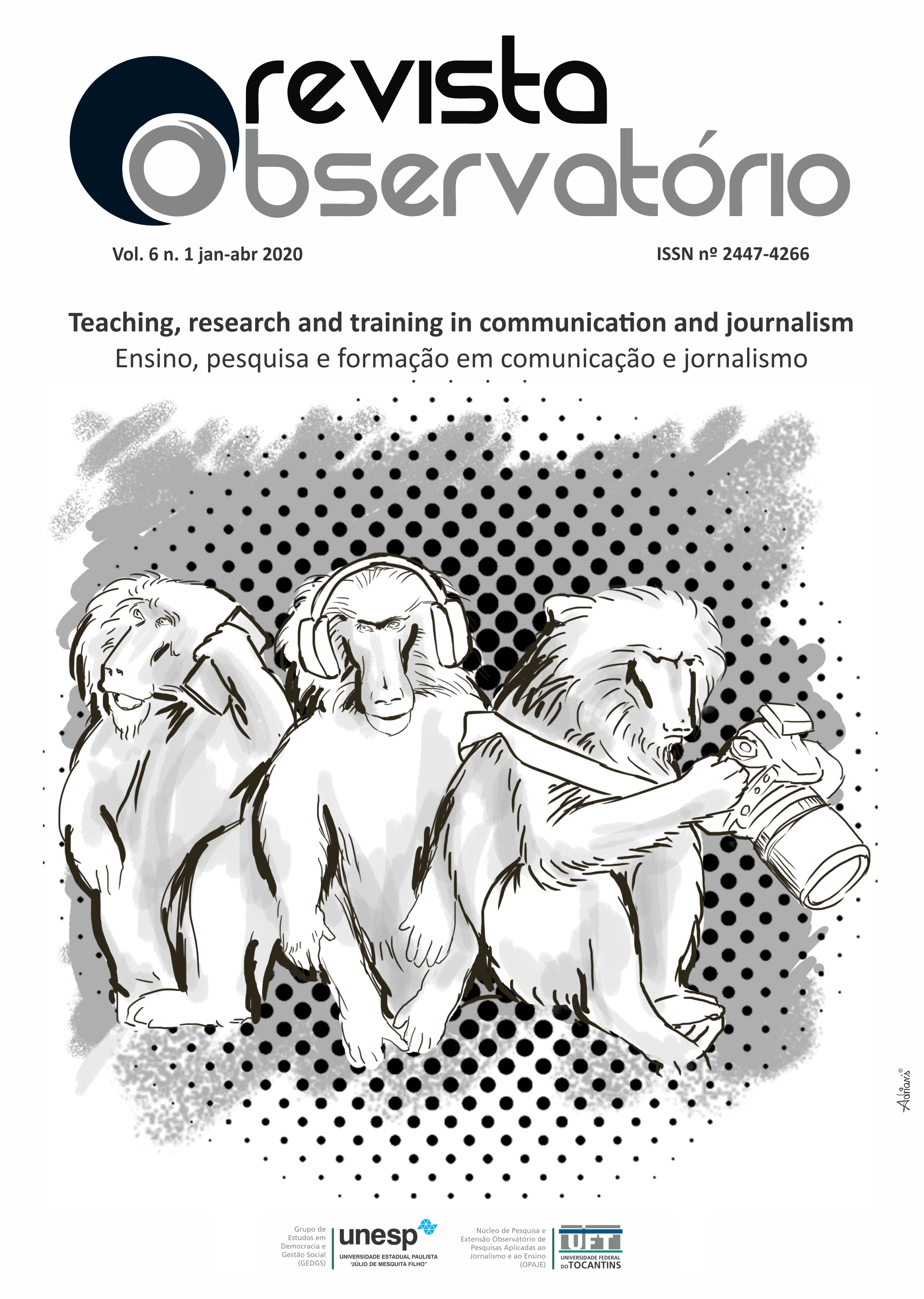Trends and challenges for the policy of manager training: an interdisciplinary analysis of intercultural education in the rural area
DOI:
https://doi.org/10.20873/uft.2447-4266.2020v6n1a14enPalavras-chave:
Training of managers, public policy, rural education, ethnic-racial relationsResumo
The research presents thoughts on certain trends in the training of educational managers and the needs for innovation to seek to fill the gaps related to basic education. These have been demanded under the panorama of the characteristic reality of rural education: the construction of demands in the fundamental education policy and its perspectives for transformations in the management itself. With the theoretical methodological mention of a bibliographic and documentary research, we sought historical and philosophical foundations for the integration of the categories worked and the empirical focus established in state schools in the Regional of Dianópolis, to delimit the field of the same, which according to the approach, the alternatives have been to seek to carry out self-training actions, simultaneously with the organization of practices in educational institutions. What has made possible a partial exercise of the curricular instrument, when contemplating an education that thinks with cultural diversities and ethnic-racial relations, seeking through experiences and dialogues, to appreciate and adopt community knowledge with the valorization of subjectivity in the ways of each community, showing them in the school routine. The contradiction between the legislation and the educational marginalization, shows the insufficiency in the applicability of education in the field, however, it is important to highlight the urgency in the reformulation of the policy of continuing education for managers, it is proposed to transdisciplinary.
Downloads
Referências
ARROYO, Miguel G. Outros Sujeitos, Outras Pedagogias. Petrópolis RJ: Vozes, 2012.
BRANDÃO, Carlos Rodrigues. O que é educação. 1 ed. São Paulo: Brasiliense, 2007.
BRASIL. Constituição (1988). Constituição da República Federativa do Brasil: Brasília: Senado federal, 1988. Disponível em:<http://www.senado.gov.br/sf/legislacao/const/>.
____________. Lei Nº. 9.394/1996. LDB – Lei de Diretrizes e Base da Educação Nacional, Senado Federal. Secretaria Especial de Editoração e Publicações. Brasilia-DF, 2007.
____________. Ministério da Educação. Secretária Especial de Políticas de Promoção da Igualdade Racial. Diretrizes Curriculares Nacionais para a Educação das Relações Étnico – Raciais e para o Ensino de História e Cultura Afro – Brasileira e Africana. Brasília, 2004.
BUTLER, Johnella (Ed.) Color-line to bonderlands: the matrix of American ethnic studies. Seatlle: University of Washington Press, 2001.
CANDAU, V. M. Diferenças culturais, cotidiano escolar e a práticas pedagógicas. Currículo sem Fronteiras, v.11, n. 2, p. 240-255, 2011.
CATHERINE, Walsh. Interculturalidad y (de)colonialidad: Perspectivas críticas y políticas. Visão Global, Joaçaba, v. 15, n. 1-2, jan./dez. 2012.
CLANET, Claude. L´interculturel. Introduction aux approches interculturelles en education et en sciences humaines. Toulouse: Presses Universitaires du Mirail, 1993.
FISCARELLI, Rosilene Batista de Oliveira. Material Didático e Prática Docente. Revista Ibero-americano em Educação, 2007. v.2, n.1.
FORQUIN, J. Escola e cultura: As bases sociais e epistemológicas do conhecimento escolar. Porto Alegre: Artes Médicas,1993.
FREIRE, Paulo. Pedagogia e Educação: ensaios . 5. Ed. São Paulo: Cortez, 2001.
GADOTTI, Moacir. História das ideias pedagógicas. 8. ed. Ática: São Paulo: 2003.
GRAMSCI, Antonio. A concepção dialética da história. Rio de Janeiro: Civilização Brasileira, 1991.
IMBERNÓN, F. (1994). La formación y el desarrollo profesional del profesorado. Hacia una nueva cultura profesional. Barcelona, Graó.
IMBERNÓN, Francisco (org.). A educação no século XXI. Os desafios do futuro imediato. Editora Grão, 1999.
YANG, Philip Q. Ethnic studies: issues and approaches. Albany: State University of New York Press, 2000.
LEMME, Paschoal. Memórias. São Paulo, Cortez / Brasília, INEP, v.2, 1988.
LIBÂNEO, José Carlos. Pedagogia e pedagogos, para quê? São Paulo: Cortez, 1998.
LINS. T. Formador de formador: características educacionais e profissionais de acadêmicos que ensinam na formação continuada stricto sensu em Gerontologia no Brasil. Revista Kairós, São Paulo, 10(2), dez. 2007, pp. 135-151.
LORROSA, J.Notas sobre experiências e o saber da experiência. Tradução: João Wanderley Geraldi. Revista brasileira de Eduacação –ANPED, n.19,Jan./ Fev./ Mar./ Abr., 2002.
MARX, K. O Capital. 8.ed. São Paulo: Difel, 1982. Livro 1, v.1. (1.ed., 1867) SMITH, A. An Inquiry into the Nature and Causes of the Wealth of Nations. 5.ed. London: Methuen and Co./Edwin Cannan, 1904. (1.ed., 1776).
MCLAREN, Peter. Multiculturalismo revolucionário: pedagogia do discenso para o novo milênio. (trad.) Márcia Morais e Roberto Cataldo. Porto Alegre: Artes Médicas Sul, 2000.
_________. Pedagogia revolucionária em tempos de pós-revolucionários: repensar a economia política da educação crítica. In: IMBERNÓN, F. (org.) A educação no século. Porto Alegre: ArtMed, 2000c, p.135 -137.
MORAN,E.F. Adaptabilidade humana. São Paulo: Edusp, 1994.
MORAES ,N. R., PÔRTO JUNIOR, F.G.R. E GILIOLI, S.N. .CONHECIMENTO E ORGANIZAÇÃO: indicativos pós-Bolonha de uma sociedade em construção. v. 3 n. 6 (2017): V. 3 N. 6 (2017). Dossiê Temático: Processos formativos, comunicação e educação pós-Bolonha Out-Dez 2017.
OZMON, Howard A.; CRAVER, Samuel M. Fundamentos filosóficos da educação. 6. ed. Porto Alegre: Artimed, 2004.
PÔRTO JUNIOR, Francisco Gilson Rebouças. Processo de Bolonha e Formação: estudos e ensaios. Alemanha: NEA-Novas Edições Acadêmicas, 2017a.
PÔRTO JUNIOR, Francisco Gilson Rebouças. Processo de Bolonha: história, formação e ensino na União Europeia. Porto Alegre: Editora Fi, 2017b.
SHÖN, D. A. (2000). Educando o profissional reflexivo. Porto Alegre, Artes Médicas Sul.
SILVA, Paula Janaína. O papel da formação continuada de professores (as) para a educação das relações raciais. Brasília, 2012.
SOUSA, J.V; CORRÊIA, J. Projeto Pedagógico: a autonomia construída no cotidiano da escola. In: DAVIS C. (el al). Gestão da escola: desafios a enfrentar. Rio de Janeiro: DP&A, 2002. P. 47-75.
TORRES , Nelson M.. Transdisciplinaridade e decolonialidade. Tradução de Juarez Bernardino-Costa. (P.2)
WALLON, H. Psicologia e Educação da Criança. Lisboa: Edições 70, 1979.
Publicado
Como Citar
Edição
Seção
Licença
[PT] Autores que publicam nesta revista concordam com os seguintes termos:
1. Autores mantém os direitos autorais e concedem à revista, sem pagamento, o direito de primeira publicação, com o trabalho simultaneamente licenciado sob a Creative Commons Attribution License (CC BY-NC 4.0), permitindo o compartilhamento do trabalho com reconhecimento da autoria do trabalho e publicação inicial nesta revista.
Leia todos os termos dos direitos autorais aqui.


